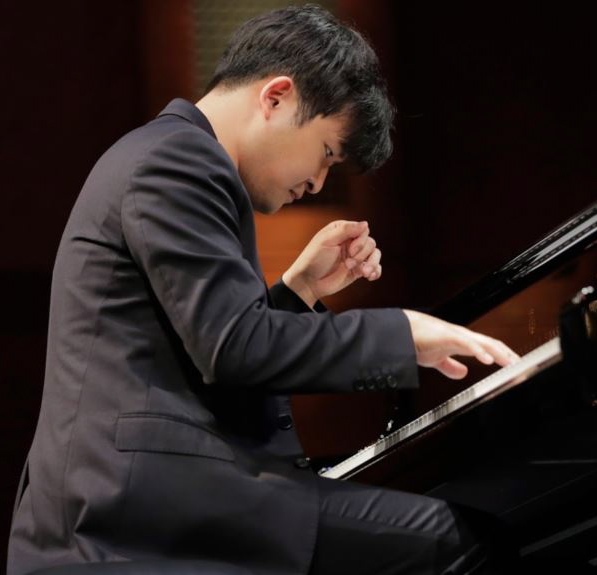Cliburn winner Sunwoo makes a mixed impression in local debut

By all accounts it was a real keyboard horserace this summer in Fort Worth at the Van Cliburn International Piano Competition. Yet even with a bevy of evenly matched front runners from around the world, many observers were taken aback when Yekwon Sunwoo took the Gold Medal. (For detailed reporting on the 2017 Cliburn semifinals and finals, check out Texas Classical Review’s wall-to-wall coverage in the site’s archive.)
Sunwoo made his local area debut Friday night in a sold-out concert at Northwestern University’s Mary B. Galvin Recital Hall. Yet while the 28-year-old Korean clearly possesses daunting power and an iron-fingered technique, the musical rewards were surprisingly mixed—helping to explain why some Cliburn handicappers were puzzled by Sunwoo’s win.
The first half of his program was devoted to a single work, Schubert’s Sonata in C minor. The least-played of Schubert’s final triumvirate of sonatas, D.958 is less epic than its companions but no less forward-looking works in its mercurial shifts and jarringly contrasted material.
Sunwoo had a clear structural grasp of the sonata, and his playing was firm, boldly projected and technically faultless–as it was all evening—without a single dropped note.
Yet I found his performance cool and the music undercharacterized to the point of blandness. Dynamics hovered at a fairly constant forte, with a lack of individuality in expression or much nuance in his blunt phrasing. He made little differentiation in the yawing chasm between the chromatic opening theme and the hymnlike consolatory motif.
The pianist began the Adagio with a simple understated dignity yet failed to bring greater expressive depth or much feeling to the music. Most crucially, here too he underplayed the eruptive chromatic dislocations in a way that undercut the turbulent drama at this work’s core. I found myself admiring the undulating wood paneling of the beautiful new Galvin Hall more than the performance that was taking place within it.
The Menuetto went better with Sunwoo showing a fleet touch in the off-center energy, And while the technical demands of the final movement were assayed with power and outsized virtuosity, the titanic dramatic struggle and emotional extremes of the nerve-wracked tarantella were barely hinted at. Coming from a Cliburn Gold Medal winner this was a disappointingly superficial performance of one of Schubert’s most deeply felt works.
Sunwoo showed more of an interpretive profile after intermission. Give him points for programming a real oddity with Percy Grainger’s Ramble on the Last Love Duet from Richard Strauss’s Der Rosenkavalier. This quirky showpiece spins off the opera’s ethereal closing duet between Octavian and Sophie with Grainger’s typical grab-bag of showy glissandos and assorted keyboard complexities. Yet while he tackled all of Grainger’s theatrics with unruffled bravura, Sunwoo’s literal performance failed to convey much of the goofy charm or subversive wit of this confection.
And so it went with Rachmaninoff’s Sonata No. 2. In this Van Cliburn speciality, Sunwoo again played with impressive muscle and gleam without providing much in the way of poetic touch or interpretive insight. His hectoring approach to Rachmanioffs lyrical moments kept the music earthbound, and the opening Allegro agitato sounded merely mildly perturbed.
In the middle movement of the Rachmaninoff, one began to realize that there had been very few true pianissimos from Sunwoo all night. Perhaps the very live acoustic of the room has something to do with it or the nine-foot Steinway he was performing on–or a combination of the two. Even from the last row on the right-hand side–as far away from the stage as one can be on the main floor–the piano sounded loud all evening.
Sunwoo was more in synch with the unapologetic drama and fireworks of the final movement, which was thrown off with daunting virtuosity and error-free playing. But this was a Rachmaninoff performance successful only in parts, without, it seemed, a unified conception of the sonata as a whole.
The pianist closed with La Valse and finally we had a clear idea of what so impressed the Cliburn judges. The chilly, impersonal brilliance of Ravel’s subversive score seemed to suit him best, and Sunwoo blazed through the score’s demands with staggering virtuosity and swaggering panache.
The instant standing ovation brought Sunwoo back out until he favored the crowd with an encore. After speaking of the extraordinary visual splendor of the venue—the towering glass wall behind the stage looks out on Lake Michigan—Sunwoo offered “Autumn Song” (October) from Tchaikovsky’s The Seasons, which provided the pianist’s most sensitive and eloquent playing of the evening.
Posted in Performances




